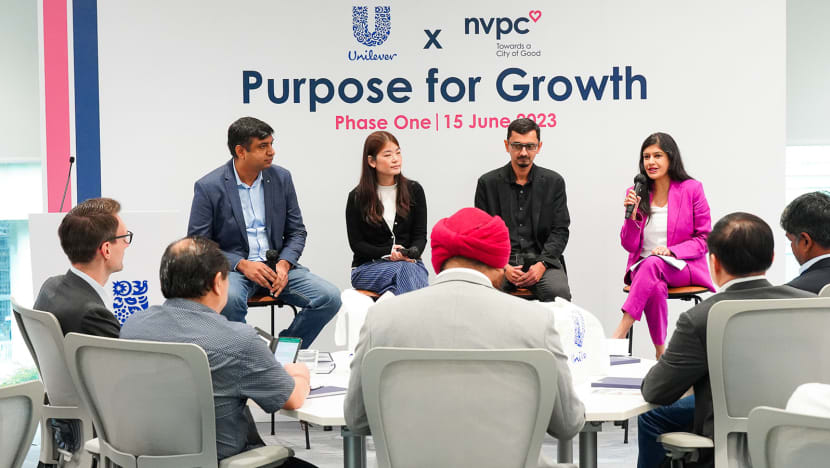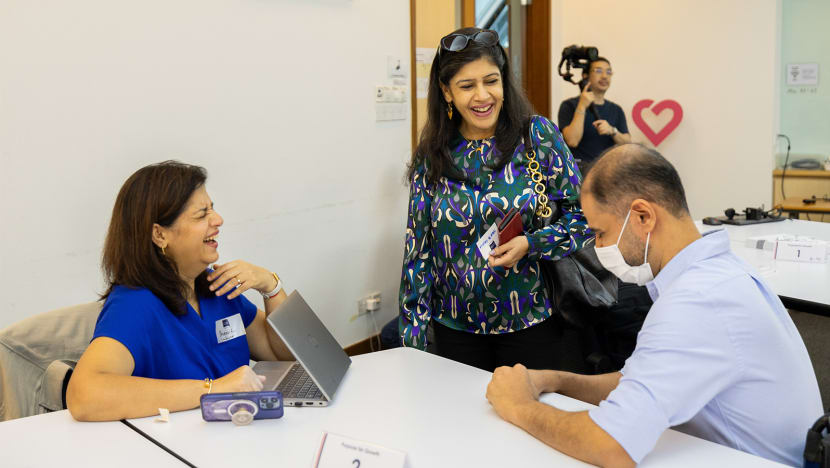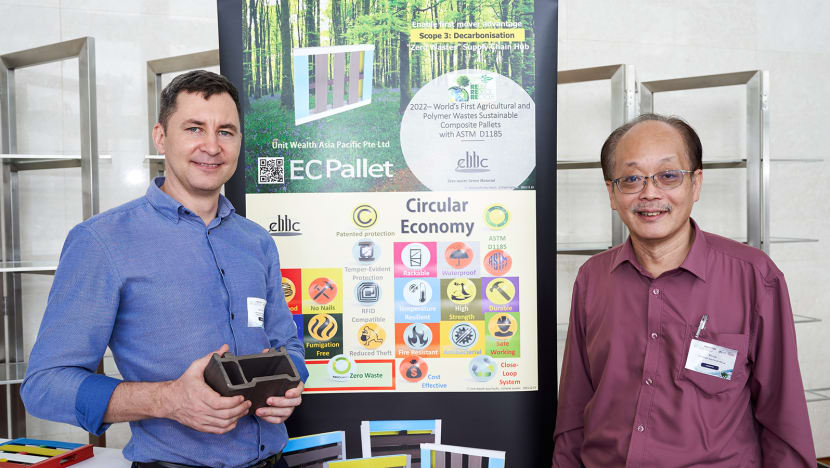How SMEs can develop corporate purpose for long-term growth
Mentored by Unilever Singapore in partnership with the National Volunteer & Philanthropy Centre, SMEs embark on a purpose-filled journey towards making a positive impact.

The National Volunteer & Philanthropy Centre (NVPC) partnered with Unilever Singapore to spearhead the inaugural Purpose for Growth programme. Photo: NVPC

This audio is generated by an AI tool.
Large corporations may have been early adopters of corporate purpose, but small- and medium-sized enterprises (SMEs) are rapidly recognising the importance of integrating purpose into their business strategies.
According to Ms Shweta Shukla, senior director and head of communications, corporate affairs and sustainability at Unilever International and Unilever Singapore Hub, corporate purpose is essential for organisations of all sizes but is particularly crucial for SMEs, as many are at the outset of their journey. “Purpose provides the fundamental answer to why a business exists and serves as a north star for SMEs as they pursue growth opportunities, navigate challenges and make meaningful contributions to their communities,” said Ms Shukla.
DEVELOPING PURPOSE FOR LONG-TERM GROWTH
As part of Unilever’s purpose in making sustainable living commonplace, the corporation partnered the National Volunteer & Philanthropy Centre (NVPC) to spearhead the inaugural Purpose for Growth programme.
NVPC serves as the steward of the City of Good vision for Singapore, where individuals, organisations, communities and leaders come together to build a more caring, inclusive and compassionate society. Through its Company of Good strategy, NVPC encourages organisations to embrace corporate purpose and create positive impact across various impact areas identified as People, Society, Governance, Environment and Economic.

The Purpose for Growth programme involves Unilever leaders mentoring SMEs in their journey of adopting corporate purpose and aligning their businesses with emerging trends in sustainability and environmental, social and governance (ESG), all aimed at fostering long-term growth and competitiveness.
Held over two phases from June 2023 to January 2024, the programme saw a total of 16 SMEs commit to integrate corporate purpose, engaging in learning sessions encompassing topics such as stakeholder communications and impact measurement. Across the sessions, each SME articulated its corporate purpose and dedicated efforts towards developing future initiatives that align with its statement.
CREATING ECOSYSTEMS TO THRIVE AND DO GOOD IN
As a Certified B Corp social enterprise, integrated creative agency Make The Change (MTC) is no stranger to doing good. But Ms Michelle Lim, MTC’s co-founder and CEO, said that the company needed to learn, explore and collaborate with like-minded corporations to co-create a better ecosystem for greater impact.

“Change is never meant to be made alone,” she noted. “The Purpose for Growth programme was a good opportunity for us to learn from the facilitators and our peers on how they define their corporate purpose and transform their organisations into being purpose-driven.”
Mr Low EC, founder of Unit Wealth Asia Pacific and sustainable materials start-up EBBC, similarly felt that Purpose for Growth was a powerful enabler of networking and collaboration with like-minded partners and fellow start-ups.

Defining EBBC’s corporate purpose helped the start-up to develop a clear roadmap, which Mr Low emphasised was important for scalability. The success of EBBC’s proprietary zero-waste shipping pallet, made entirely from recycled waste, requires a network of companies that are committed to the same vision of sustainability and carbon neutrality.
Through the Purpose for Growth programme, EBBC developed its corporate purpose statement: We provide a seamless Scope 3 decarbonisation solution for supply chains from various industries.
“Leveraging our smart pallets, we want to contribute to the evolution of the logistics industry in Singapore and play an integral role in Singapore’s goal of becoming a net-zero transhipment hub in the Asia-Pacific region,” said Mr Low.
For MTC, which seeks to transform communities through design, education and consultancy services, the programme served as a platform for the company to fine-tune its corporate purpose statement. It also enhanced the company’s ability to effectively communicate its values through brand and marketing communication strategies.
“Our corporate purpose statement is: Empowering changemakers through design and education,” said Ms Lim. “We want to use design and education services to empower individuals and corporations so that they can become a changemaker of positive impact within their sphere of influence.”
Currently, MTC connects its clients in creative or digital marketing services with opportunities to engage in corporate social responsibility initiatives that benefit under-served communities and non-governmental organisations.
It is also involved in an initiative by the Infocomm Media Development Authority, where students are not only taught new media skills but are mandated to apply these skills towards addressing a social issue, such as cyberbullying, as part of their course completion requirements.
Having refined its corporate purpose, MTC is now streamlining its broad-based services to achieve a higher quality of impact. According to Ms Lim, a revamp of its freelancers’ portal named Younite – initially designed to serve under-privileged talents who graduate from MTC programmes – is in the works. MTC also plans to work alongside talent sourcing social enterprises, joining hands with their coaching services to promote a more inclusive corporate hiring culture in Singapore.
CATALYSING A JOURNEY OF GROWTH
Ms Shukla, who was one of the mentors for the programme, noted that the success of the Purpose for Growth programme lies not only in enhanced business results, but also in tangible societal impact achieved. Her advice for SMEs looking to adopt corporate purpose is to view purpose as a catalyst for responsible and sustainable business growth, rather than an end in itself.

To achieve a purpose-driven growth journey, SMEs should cultivate a robust network of business stakeholders and supporters, while nurturing an internal culture of innovation through ongoing upskilling and knowledge expansion among team members.
According to Mr Low, the Purpose for Growth programme has helped EBBC identify goals and key performance indicators that tie in with its mission.
He added that EBBC is seeking partnerships with corporations and other stakeholders to deliver practical decarbonisation solutions. It is also dedicating significant resources to research and development in sustainable material technology, and enhancing its products through supplier collaboration and stakeholder feedback.
“Corporate purpose can be a competitive advantage to drive positive outcomes for both the business and society,” Ms Shukla said. “By aligning purpose with growth objectives, SMEs can unlock new avenues for innovation, build resilience and forge impactful connections within their communities.”
Learn how you can drive your corporate purpose at thecompanyofgood.sg.















